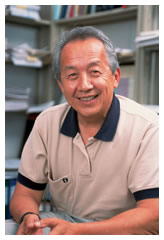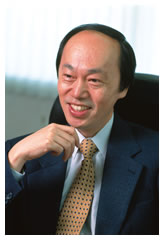Quality assurance in education: making a big difference
Enhancing communication
Professor Ko set up an internal TLQPR (Teaching and Learning Quality Process Review) network early this year, headed by a task force of some 30 staff members, to spread the message on quality assurance through the ranks. The task force includes representatives from each academic department as well as a number of academic units, each having either teaching functions or a student learning focus. One of its major tasks, said Professor Ko, is to introduce best practices in teaching and learning to the campus community. In addition to holding meetings, the group has also launched a Website to get its work off the ground.
3Ps framework
In March, the University Senate endorsed a comprehensive quality assurance framework for the University. Developed and proposed by CityU's Quality Assurance Committee (QAC), the framework is known as the 3Ps: principles, policies and practices. "It is the first time we've had a system that is at once comprehensive, integrated and up-to-date," said QAC Chairman Professor William Wang, Chair Professor in the Department of Electronic Engineering and the Department of Chinese, Translation and Linguistics. "We hope this will help us ensure that there's quality throughout."
Principles, the first of the 3Ps, state the University's commitment to providing quality education and its responsibility in assuring that quality. The second "P" stands for policies, the interpretation of principles put into motion. Practices, the third "P", contain real examples and practical guidelines for reference by each academic unit.
Devolution of responsibilities
"The devolution of responsibilities is a major feature of the new quality assurance process," Professor Ko said. He believes ownership of academic decisions should by and large reside in the departments, with a centralized function or administrative office yielding the necessary support, coordination and, sometimes, strategic guidance. He encourages faculties and departments to start their own teaching and learning support infrastructure. The Faculty of Business, for example, now has its own learning enhancement centre while the Faculty of Science and Engineering has appointed an associate dean in charge of education and is about to set up a faculty teaching support group. TheApart from arousing action and support at the grassroots level, Professor Ko also hopes to develop better coordination and planning of educational matters, large and small. This is the reason behind the recent launch, on 1 July, of an Education Office, which pulls together existing sections of the Centre for the Enhancement of Learning and Teaching and the Registrar's Office. Essentially, the new set-up brings together under one umbrella the numerous functions, supporting the Academic Policy and Quality Assurance committee, and institutional research. The move should result in faster data analysis and better decision support to meet the dizzying changes in today's higher education environment.


